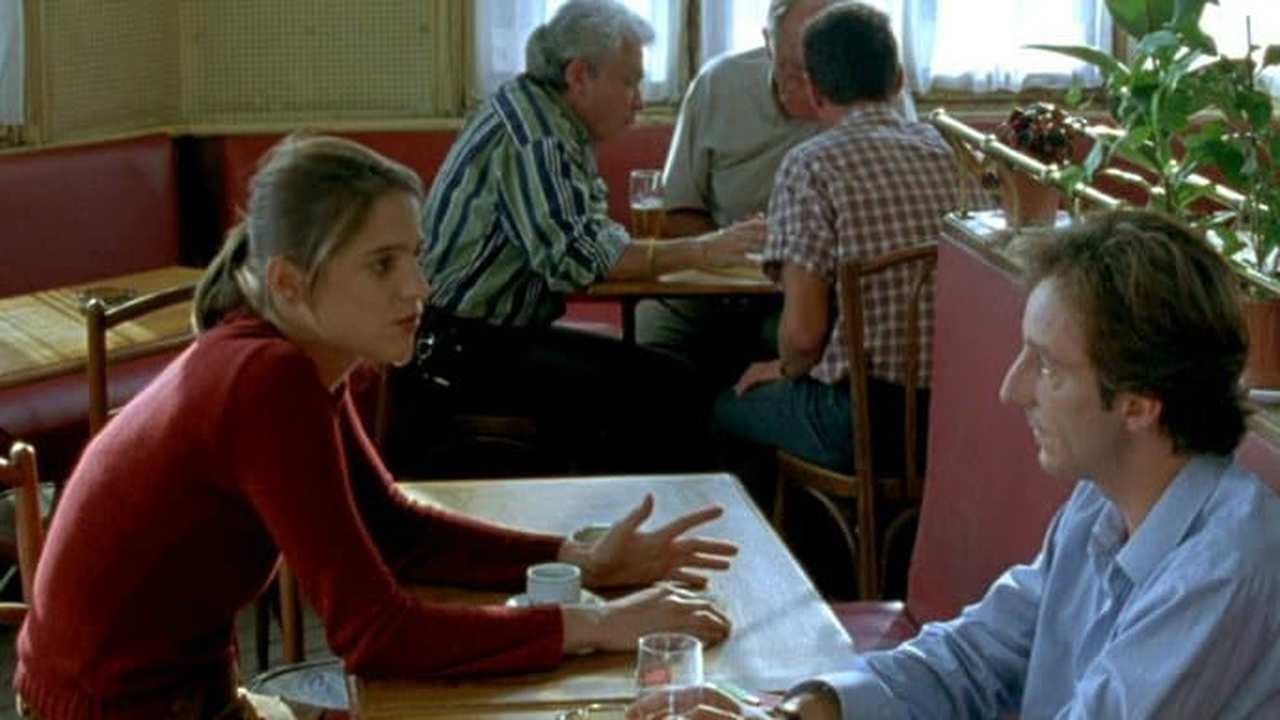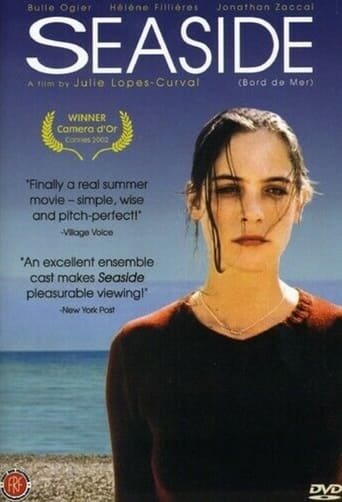

Wonderfully offbeat film!
... View MoreOverrated
... View MoreHorrible, fascist and poorly acted
... View MoreGreat example of an old-fashioned, pure-at-heart escapist event movie that doesn't pretend to be anything that it's not and has boat loads of fun being its own ludicrous self.
... View MoreI happened to be living in France when this film was released back in 2002. It had received lukewarm reviews. So, to my surprise and delight, I enjoyed it far more than I'd expected. In terms of its strengths, the acting/casting/direction are all well done (and the story is nearly like a soap opera in that it follows different individuals and couples very loosely connected with each other (if at all). They all live or are on vacation in a small seaside town on the French Atlantic coast. In my opinion, the screenplay is the single strongest aspect of this film; and although some might say that all French films are "indie" from the American perspective (which is not so), this film most definitely has an indie feel to it. The soundtrack, for one, is an indie-type soundtrack. At times, I was reminded of the American indie film "You, me, and everyone we know"...in terms of style (visually, Seaside is not as strong; but in terms of storytelling, it's every bit as strong). Seaside, too, has a lot to say about modern relationships, and it does it across a number of couples (not 1) and there are numerous valuable insights. But it's not merely about relationships; it also deals intelligently with work, social class, and addictions, among others. Finally, Seaside does an excellent job of capturing the modern French woman who's in her 50s or 60s (wholly outside of romance). Yes, this film is "typically French," but these are just the type of French films that I find truly satisfying...Thanks to all involved, and enjoy.
... View MoreThis is another charmer. The great thing about France is that filmmakers are allowed to make 'small' films like this without being penalized. In the same year (2002) for example Le Chignon d'Olga was also released and between them both films racked up something like 100,000 admissions but nobody yelled, no heads rolled, in fact Julie Lopes-Curval who directed Bord de mer went on to write La role de sa vie which co-screenwriter of Bord de mer, Francois Favrat, directed and with Agnes Jaoui and Karin Viard co-starring 'Role' was a much more high-profile project. Not a lot happens in Bord de mer. If you want an analogy it's something like Walden if Thoreau had been part of a community. It's just a record of a year in a small seaside town which is virtually almost always out-of-season even in the summer because the only visitors are regulars, most of whom own property rather than staying in hotels/pensions. It's a company town to the extent that a small family company 'mine' the sea for stones which are then 'sorted' by the locals and used to manufacture anything that CAN be manufactured from pebbles. We follow a handful of people, the best known being Bulle Ogier and Ludmilla Mikhael, ex-Comedy Francaise as they are, in the immortal words of Johnny Burke, busy doing nothing. The film is shot in lovely, not to say restful, pastels and a second viewing some two years later was just as enjoyable as the initial one.
... View MoreBord de Mer is an unusual French movie. The director, Julie Lopes-Curval, provides us with an image of France that tourists--and filmgoers--rarely see.This film is set entirely in a small seaside town. Few French tourists visit, and apparently international tourists have not yet discovered the site.Besides some seasonal tourism, the only obvious local industry is a factory that converts the stones from the shore into industrial materials. The jobs performed by the women workers at this factory are horrendously boring. The workers stand all day as a conveyor belts moves small stones along. These stones must be hand sorted to eliminate defective ones. Imagine standing at an assembly line for eight hours every day sorting stones, and you can understand the desperation of the workers.The social classes in the town are divided into the factory workers and other townspeople who find what work they can--in shops, as lifeguards--and the wealthy few who own or manage the factory.In the warm weather, the "summer people" arrive. These people are not tourists in the sense that they are passing through; they tend to own summer property and spend several months in their summer homes each year. Nonetheless, they have little in common with--or knowledge about--the people who live in the area all year.The movie takes us through a year in the town. People watch their fortunes rise or fall, or just watch another year pass by.This is an ensemble film, and the acting quality is good. However, I didn't recognize any of the actors other than Bulle Ogier as Rose, a compulsive gambler who only simply cannot stop gambling, even after she has lost everything she owns or can borrow.The interesting young actor Hélène Fillières plays Marie, one of the factory workers, who suddenly realizes that what she has to look forward to, after 20 years on the assembly line, is only a watch and a bottle of champagne. Marie's moment of realization, and the choices she makes at that critical point, constitute one of the major sources of drama in the movie.I think that this is a movie that would be much more satisfying to someone who is a native speaker of French, or at least has a detailed knowledge of French society. I'm certain that many subtle differences in regional and class accents went right past me. Even so, this is a quiet, intelligent movie that is worth seeing.
... View MoreFilms about the mundane are often the most interesting of all films to me, in the hands of an insightful artist who examines all the twisted little details of the mundane. The French cinema seems to often be very good at this sort of thing, and I love the French cinema.This film was about the mundane. It didn't have a much of a plot. It was just characters who lived in a town, very normal people, and stuff just happened. But it wasn't very interesting stuff, and it wasn't examined very insightfully. The film did capture a bit of a mood, but it wasn't a particularly captivating mood. And while I can't think of much that the film did specifically wrong, it failed on just about every level to do anything right.There were a lot of characters in this film. A lot of them kind of looked alike, so it was hard to figure out who was who, and what were their relations to one another. I don't mind putting some effort into understanding a film, or even watching an especially complex film more than one time to iron out the details, but this one was a puzzle not worth the solving for me.The only good thing I can really say about this film is that the cinematography was pleasant--functional, not brilliant, but pleasant. The camera often captured some nice postcard-type shots. But it rarely found the really interesting little details.I've seen a handful of not-so-good films so far at the Seattle International Film Festival, but this was the only one that failed to get any applause when the credits rolled. I sensed a big collective sigh of relief when the film was finally over. But I suppose there are probably some people out there who would like it.4/10
... View More